The Malaysian ringgit (or Malaysian dollar) is the official currency of Malaysia. Its ISO 4217 code is MYR and its symbol is RM. The Malaysian ringgit is divided into 100 sen.
As of August 21, 2023, the currency equivalent of the Malaysian ringgit to the euro is:
- 1 euro = 5.07 Malaysian ringgit.
- 1 ringgit = 0.20 euros.
History of the Malaysian ringgit
The ringgit (also known as the Malaysian dollar) was established as the official currency of Malaysia in 1946, when it replaced the Straits Settlement dollar (Federal Malaya and Borneo dollar), a colonial currency created at mid 19th century. At the time, Malaysia had an agreement with Singapore and Borneo to have their currencies equal in value, but the country left that agreement behind in 1973.
Already in 1993, the Malaysian currency abandoned the symbology of the dollar and adopted the symbol RM, which is maintained to this day.
Malaysian ringgit coins
The Central Bank of Malaysia (Bank Negara Malaysia) has the sole authority to issue banknotes and coins in Malaysia. The Malaysian ringgit is divided into 100 sen. In the Malaysian country there are coins of 5, 10, 20 and 50 sen in circulation.
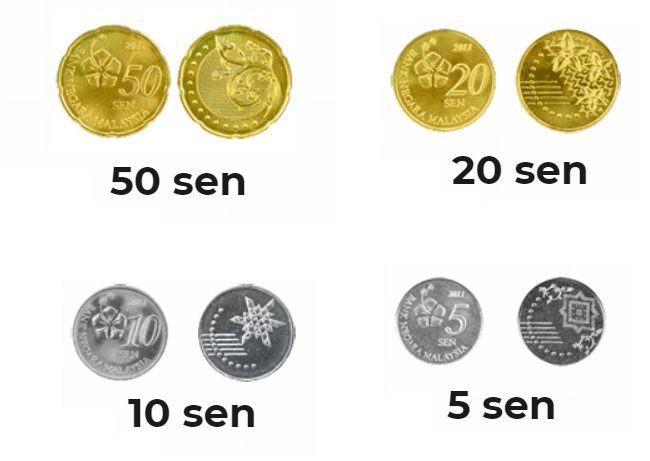
All these coins in circulation have the same image of a hibiscus flower on the face but change on the cross.
- The 5 sen coin shows the following destar;
- The 10-sen coin has a floral decoration from the Mah Meri tribe;
- The 20 sen coin shows jasmine flowers;
- The 50 sen coin shows a tendril of peas.
Its equivalent value in euros is really ridiculous if we take into account that 1 ringgit today would be equivalent to about 20 euro cents.
Malaysian ringgit banknotes
The current series of ringgit banknotes is the fourth, dating from July 2009 (RM50) and June 2012 (RM100, RM20, RM10, RM5 and RM1). They are printed by the Central Bank of Malaysia (Bank Negara Malaysia BNM) which is also in charge of minting Malaysian coins.
The obverse of each of the colorful banknotes features an image of Tuanku Abdul Rahman (Abdul Rahman of Negeri Sembilan), the first yang di-pertuan agong (supreme ruler) of Malaysia, who reigned from 31 August 1957 and April 1, 1960.
These banknotes have the following denominations:
- 1 ringgit
- 5 ringgit
- 10 ringgit
- 20 ringgit
- 50 ringgit
- 100 ringgit.
The reverse of most banknotes contains images related to Malay culture, natural wonders, flora and fauna, and technological and economic achievements.
For example, the rhinoceros hornbill bird appears on the 5 ringgit note; Rafflesia azlanii, a native flower of Peninsular Malaysia, is the subject of the 10 ringgit note; and an oil palm, the source of palm oil, one of Malaysia’s main exports, is on the 50 ringgit note.
Below we see images of the current Malaysian ringgit banknotes.
1 malaysian ringgit note
Blue colored banknote with Tuanku Abdul Rahman on the obverse and a wau bulan (traditional Malay kite) on the reverse. This fourth series banknote dates from June 2012 and measures 120 mm x 65 mm.
The 1 ringgit (RM1) note is dedicated to the popular traditional sport in Malaysia, kite flying. This hobby is traditionally a celebration of a good harvest that brings together local communities in the states of Kelantan and Terengganu.
Among the best known and most iconic Malaysian kites is the ‘Wau Bulan’ or Moon Kite, featured on the new RM1. Wau Bulan, which is made by hand from bamboo and paper, is also a popular decorative item that graces the walls of Malaysian houses.
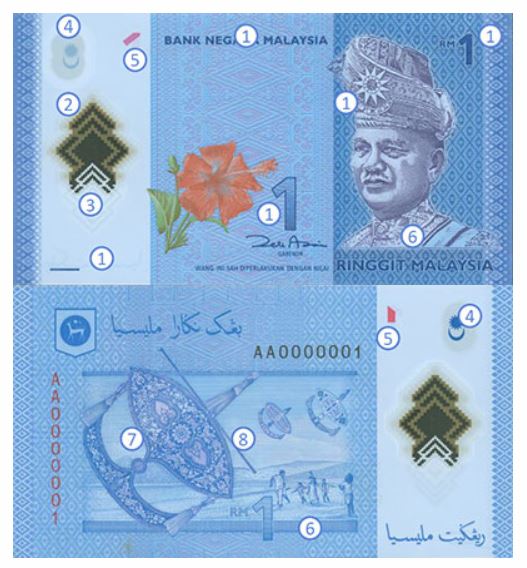
The current value of this one ringgit note at French currency suppliers would be about 20 euro cents.
5 malaysian ringgit note
Green banknote whose fourth series dates from June 2012 and measures 135 mm x 65 mm.
It shows Tuanku Abdul Rahman on the obverse and two rhinoceros hornbill birds in the jungle on the reverse. The 20 ringgit (RM20) note shows on its reverse the rhinoceros hornbill (Buceros rhinoceros), in English, Rhinoceros Hornbill, one of the largest and most magnificent hornbill species in the world.
Found in low densities in various rainforests across the country, this beautiful broad-winged, long-tailed forest bird plays an important role in traditional customs and ceremonies in Sarawak where it is known as ‘Bumi Kenyalang’ or ‘Land of Hornbills’. The hornbill or “hornbill” is also perceived as a symbol of strength and courage by the native communities of Sarawak.
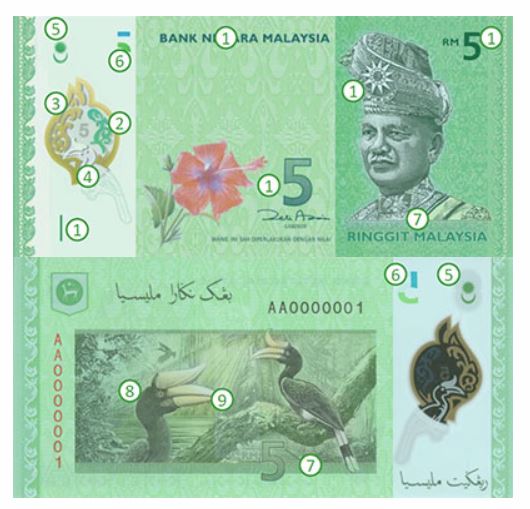
The current value of this five ringgit note at French currency suppliers would be one euro.
10 malaysian ringgit note
Note in reddish tones with the effigy of Tuanku Abdul Rahman on the obverse. It dates from June 2012 (fourth series) and measures 140mm x 65mm.
The 20 ringgit (RM20) note features on its reverse the lush Malaysian rainforest, one of the oldest living rainforests in the world. This jungle is the habitat of the spectacular Rafflesia, the largest flower in the world.
The species Rafflesia Azlanii is indigenous to Peninsular Malaysia and was first discovered in the Royal Belum Forest Reserve in Perak State in 2003. To commemorate its discovery, this majestic flower is named after the Sultan of Perak, Sultan Azlan Muhibbuddin Shah ibni Almarhum Sultan Yusuff Izzuddin Shah Ghafarullahu-Lah.
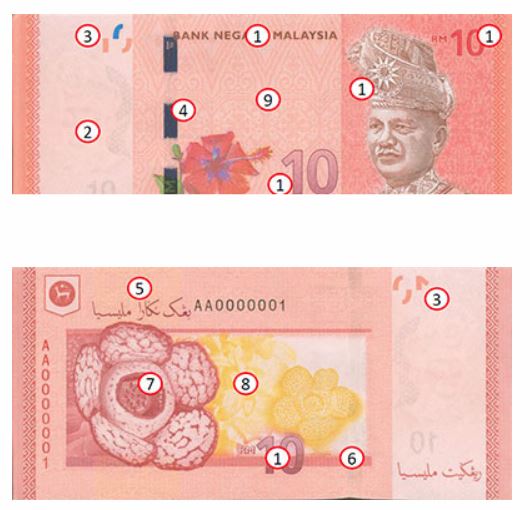
The current value of this ten ringgit note at French currency suppliers would be two euros.
20 malaysian ringgit note
Orange colored banknote with Tuanku Abdul Rahman on the obverse. His fourth series dates from June 2012 and also measures 140mm x 65mm.
The reverse of this 20 ringgit (RM20) note features elements of Malaysia’s rich and colorful marine life. The country’s tropical waters are the habitat of two of the best-known species of endemic Malaysian sea turtles: the hawksbill turtle (Eretmochelys imbricata) and the leatherback turtle (Dermochelys coriacea).
The hawksbill turtle is easily identified by its curved beak and scaly carapace, while the leatherback has leathery skin and seven ridges on its carapace.
These gentle turtles are a reminder that their existence rests on the delicate balance of human activity and the conservation of marine life.
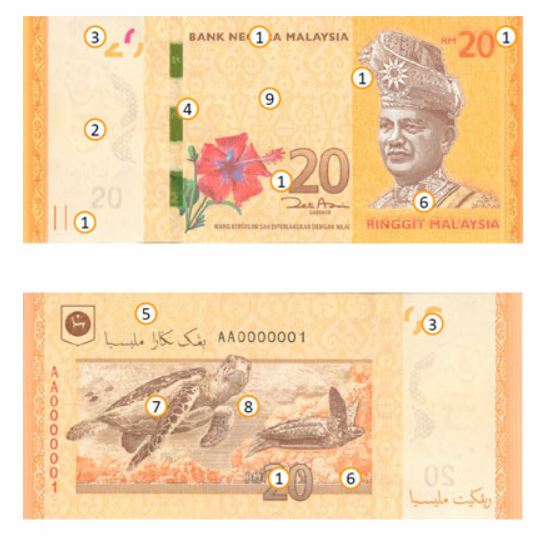
The current value of this twenty ringgit note at French currency suppliers would be four euros.
50 malaysian ringgit note
The 50 ringgit (RM50) note adopts the predominant green-blue color. The current banknote is from the fourth series, dates from July 2009 and measures 145 mm x 69 mm.
The obverse shows the portrait of Tuanku Abdul Rahman on the obverse and oil palm trees on the reverse. On the reverse, the main theme of the design is the Malaysian National Mission to “move the economy up the value chain” and reflects Malaysia’s economic transformation towards higher value-added activities in the agriculture, manufacturing and service sectors. the economy.
The background and edges of the note show weaving design patterns to reflect the craftsmanship and embroidery of traditional Malaysian textiles.
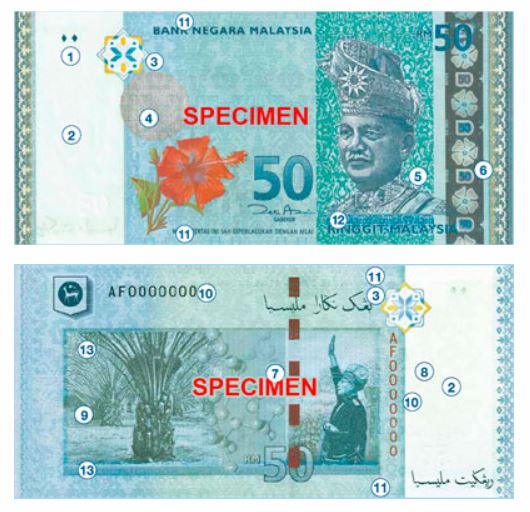
The current value of this fifty ringgit note at French currency suppliers would be about ten euros.
100 malaysian ringgit banknote
This light blue and orange banknote measures 140 mm x 65 mm and shows the portrait of Tuanku Abdul Rahman on the obverse.
The reverse shows Kinabalu Park (Sabah), home to the majestic Mount Kinabalu (the highest mountain in Southeast Asia) and the spectacular limestone rock formations of Gunung Api Valley, found within Mulu National Park (Sarawak).
Both have been declared ‘World Heritage Sites’ by the United Nations Educational, Scientific and Cultural Organization (UNESCO) and represent Malaysia’s many natural wonders that provide visitors with a unique experience.
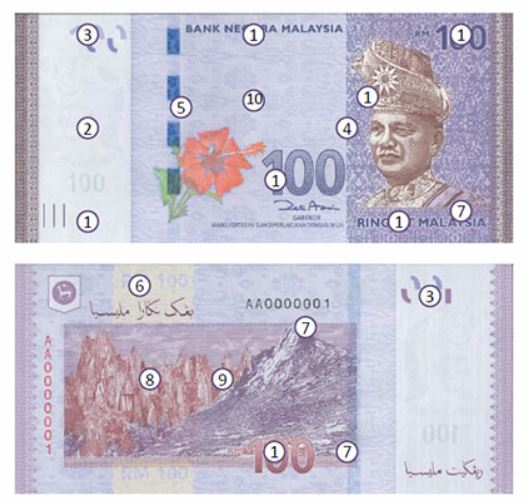
The current value of this one hundred ringgit banknote at French currency suppliers would be about twenty-two euros.
Euro to Malaysian ringgit exchange rate today
The euro-Malaysian ringgit exchange rate has not undergone major variations in the last 5 years, remaining around 4-5 ringgits per euro (as of the date of this August 2023 update, it is trading at 5.07 ringgits per euro) .
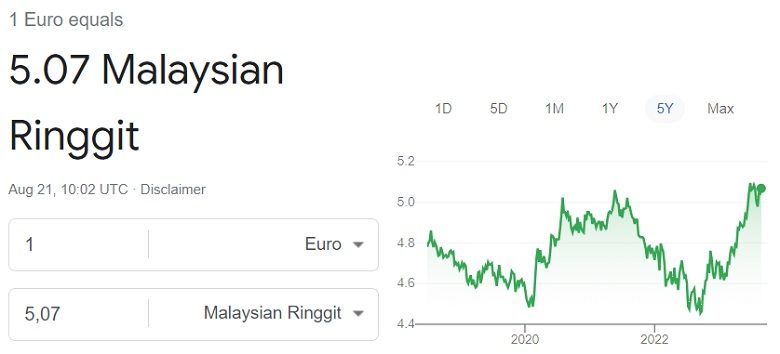
As you can see, the exchange rate in recent years has been floating between 4.5 and 5.1 ringgit per euro, but keep in mind that this chart represents the value of the Malaysian ringgit “currency” against the euro, not the of real paper currency (paper banknotes), which is lower.
In fact, in the currency suppliers in France (they are called “bureaux de change“) you can buy ringgit today at an exchange rate of about 4.44 MYR, for each euro from Comparer Devise or the 3.44 that they give you at main French airports (managed by supplier Global Exchange). Nothing to do with the euro to ringgit currency exchange rate of 5.07 ringgits per euro today.
So, when you see these values in Google and other currency converters with your mobile, keep this in mind:
-This is an unofficial rate, and therefore, unreliable. That is, if you click on the “Disclaimer” link, you get this Google Finance warning: “Google cannot guarantee the accuracy of the exchange rates shown. Confirm the current rates before making a transaction that may be affected by changes in exchange rates. ”
-These rates you see are usually wholesale rates of the ringgit currency versus the euro currency (currency and travel money are not exactly the same);
-This rate can only be held by the banks (interbank market), that is, it is impossible to achieve it as a private individual.
If you need ringgit banknotes you will have to go through the retail banknote market (bank or currency provider). This means that the MYRs have had to be “transported” by someone for you to enjoy them (or bought from travelers from Malaysia, passing through France previously).
In other words, moving paper notes from one place to another has logistic costs that will make their selling price more expensive (the exchange rate that will be applied to you by the seller).
The ringgit a currency not very abundant in France. Therefore it is not easy to find it available for sale in the currenciy suppliers. So it is good to anticipate the purchase and order them online to get a better price.
Where to exchange Malaysian ringgits in France
The 3 most popular places to exchange ringgit (MYR) in France are banks, currency suppliers and the airport.
Of these, the least recommended place to buy is the airport (they charge a commission and offer poor rates) and the high street banks, which charge a commission of 1 to 3% in addition to an “exchange spread” (difference between the price for which the bank paid the currency and the price for which it is sold to you).
Best euro to malaysian ringgit rates today in France
To find out the best euro to malaysian ringgit exchange rates today, you can use our currency comparator. It’s free for you, whether you’re buying Malaysian ringgit or selling it for euros:

Sin comentarios